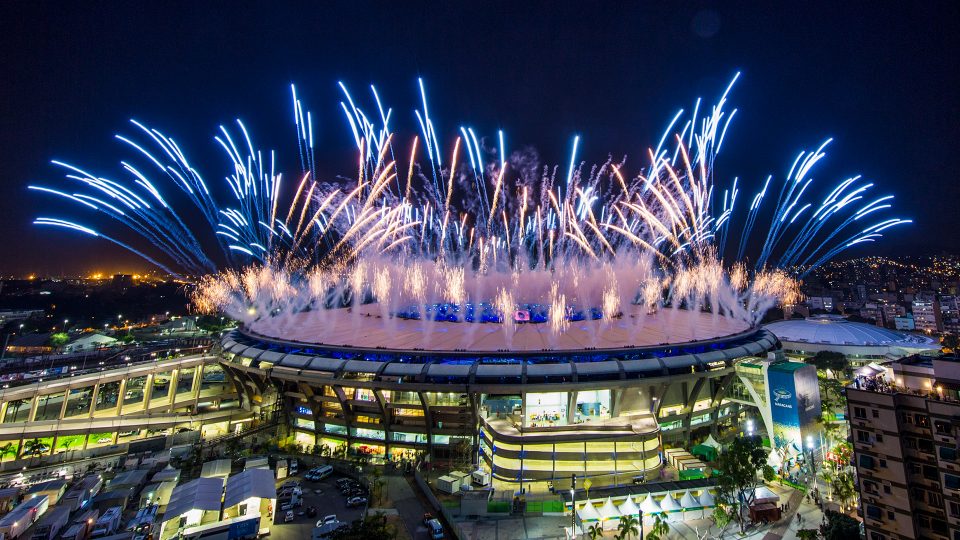
Fireworks light up the night sky during the Rio Olympics opening ceremony
An insider look at the way that cities are awarded the rights to host the Olympics as Emma Newbery breaks down the campaign
At Rio’s opening ceremony, all eyes were on the city for all the right reasons. Audiences both in the stadium and around the world were blown away by a spectacular show that celebrated everything the Olympics should stand for.
However, the preceding weeks, months and even years had been filled with stories of potential disasters, security fears and unfinished venues. We see those same stories with almost every cycle of the Olympic Games – until the moment when the sport itself finally takes centre stage, with all the extraordinary performances and inspiring stories that make the Olympic and Paralympic Games so special.
There will always be challenges and problems, partly because hosting a mega-event like the Olympics is such a massive logistical undertaking; partly because potential failure makes for a good story; and partly because the Olympic Games are sometimes awarded to cities who struggle to deliver them.
So why was Rio awarded the rights to host the Olympic and Paralympic Games?
Right now Brazil is in the midst of an all-consuming political and economic crisis. The country is facing its deepest recession in decades; unemployment stands at 11.2%; while its congress is mired in a corruption scandal of Olympic proportions. It is easy to understand why some citizens are protesting the Games’ estimated USD$4.6 billion price tag when the government is struggling to pay police and doctors and cash is desperately needed for schools and hospitals.
But back in 2009, when the election took place, Brazil was the world’s darling. Billed as Latin America’s biggest economic success story, the World Bank predicted that they would soon be the world’s fifth largest economy. It was against that backdrop that Rio was elected as the 2016 host city by an unprecedented landslide.
Host cities are chosen by around 115 individual IOC Members from about 70 countries. And, as with any election, each person votes according to their own ideas and their own motivations. Some will always do what they think is best for the athletes, some for their sport, some for the environment or the paralympics. Others vote for their friends, or return favours from previous elections.
One of the IOC’s greatest strengths – and biggest weaknesses – is that almost everything is decided by a vote. The members vote to elect new sports to the programme, they vote to elect their president and executive board members, they voted recently to decide whether or not to ban Russian athletes from competing.
What this means is that the organisation is a perpetual circus of campaigning – and without wanting to focus too deeply on that other c-word – I would venture that in the IOC, campaigning is actually more powerful than corruption.
Rio beat Chicago, Madrid and Tokyo in the 2016 campaign – even though for much of the process they looked like an extremely unlikely choice.
The city’s previous bids had barely made it out of the starting gates, so their first challenge was to create a credible technical proposal, which they did. Strong technical bids will never win the race alone, but they are an essential foundation from which to lobby.
From an opposing camp in Japan, I watched with a mixture of horror and admiration as Rio executed a textbook campaign. Everything we did, they did better. And my delightful – but shy – Japanese colleagues were out-lobbied and out-charisma-ed at every event we attended.
It wasn’t just the dynamic bid leadership who built strong relationships with every member. They also had President Lula, who won favour and demonstrated the government’s commitment by taking such an active role. He wrote to the members. He phoned them. He came to events and participated in the Evaluation Commission when the IOC came to town. People simply couldn’t fail to like his down to earth and charming personality. When Lula stood on the stage in their final presentation in Copenhagen, he wasn’t just the president of the country – he was their friend.
It was very different for the United States, who brought an ill-prepared President Obama to their final presentation. His presence actually back-fired because IOC members found his speech arrogant and were offended that he hadn’t taken the time to understand the Olympic movement. Taken in the context of a simmering battle over revenue sharing between the US and the sports movement, it did Chicago no favours at all.
A final key ingredient behind Rio’s success was a well-presented narrative that offered a compelling vision for the Olympic Movement. There were of course many other factors at play, but when Brazil offered IOC Members the opportunity to bring the Games to South America for the first time, it struck a chord and won over many undecided – or second/third round – voters.
The past seven years have not been kind to Brazil, who I am sure will host a great Games. But in a wider context, it is sad that an event that should have showcased the best of the country and left a positive legacy for future generations may well have exactly the opposite effect in Brazil.
Emma Newbery spent 10 years working as a consultant to cities bidding to host the Olympic and Paralympic Games: a world she has now left behind to edit the Bogotá Post.




